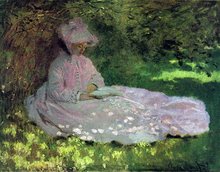First of all, a hearty congratulations to Danielle Wheeler on her new baby (born April 14th).
OK - The Kite Runner. How different pre-Russian-invasion Afghanistan is from the Afghanistan we see on the news today? Even though toward the end of the book it was pointed out that the Afghanistan of the rich (Amir's family) was different from the Afghanistan of the normal person, it was actually heart-breaking to picture a happier, normal Afghanistan where kids can watch John Wayne movies and drink Coke.
I had a hard time sympathizing with Amir as a child. I was amazed at how much angst a little child could have, but also at how perceptive they are - Amir was so jealous of Hassan when they were little, and it was probably because he could sense his father's inner struggle. I did find the quote on page 51 very poignant - where Baba buys kits for both Amir and Hassan, and Amir wishes his dad would let him be the favorite. Doesn't every human have the need to be somebody's favorite - at least one person's favorite? Doesn't everybody want someone to prefer their company?
In the discussion questions, there's a question that references the pomegranate tree - "One summer day, I used one of Ali's kitchen knives to carve our names on it: 'Amir and Hassan, the sultans of Kabul.' Those words made it formal: the tree was ours." Then later in a letter to Amir, Hassan says that "the tree hasn't borne fruit in years." The tree represents the "friendship" between the two boys (although Amir earlier says he didn't think of the two of the as friends... in the conventional sense). How ironic that the tree that emblazoned their moment of true friendship would be barren for years - barren like the years wasted because of Amir's reluctance to stand up for Hassan.
I like that Amir had the opportunity for redemption - that he was able to finally defend his true friend. I like that Amir could finally make up for what he did - the he finally was able to become whole.
SPOILER ALERT: I really had no idea that the vicious Taliban member with the John Lennon glasses was going to be Assef. However, didn't it really have to be? I mean, for Amir to be able to really atone for the hurt he caused Hassan, the final "showdown" had to be between the original triangle - Amir, Hassan (Sohrab) and Assef. Why didn't I see this coming? Why was I shocked?
There is so much I could say about this book. I turned down so many pages when I read something I found intriguing, touching, or powerful. I like the ending as well - it wasn't a forced, contrived ending - it didn't end with everything being better. It ended with a little progress made by Sohrab. Amir's downfall began with a kite - and his new, redeemed journey begins with another kite. A kite - flying around with easy motion...
Subscribe to:
Post Comments (Atom)

2 comments:
"Amir's downfall began with a kite - and his new, redeemed journey begins with another kite." I like that, Katie. I like how the ending wasn't your typical "feel good" ending. It was appropriate for the tragic story it was. Progress, for poor Sohrab.
What I love about books like this (meaning, stories from another place or time or generation) is that they reiterate that we are all human and share so many emotions. We do want to be someone's favorite. We are fearful. We sometimes even watch the same movies and drink the same soft drinks. We are not that different after all.
Post a Comment